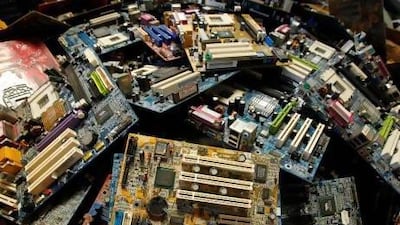Every year, thousands of mobile phones, computers, and TV sets – either broken or unwanted – end up in the rubbish.
Some are collected and sent to developing countries, often being burnt and recycled inappropriately. Others end up at municipal landfills here and become hazardous waste.
But if five former students of the American University of Sharjah have their way, the unwanted devices will be recycled and valuable metals such as copper, gold, silver and palladium extracted.
The team spent one academic year – from September 2011 to May 2012 – developing a plan for how to do this as part of a project required for their chemical engineering degree. The effort was overseen by Professor Taleb Ibrahim at the university.
The team are focusing their efforts on printed circuit boards (PCBs), thin plates composed mainly of copper, glass fibres and epoxy resins, on which chips and other electronic components are soldered.
“In today’s world, they form the backbone of any electronic device,” said Said Nusri, 22, one of the five team members.
Besides copper, the boards consist of a host of other metals, plastics and ceramics. The metals and non-metals are stuck together by epoxy resin and this makes them difficult to recycle.
Most countries in the world, including the UAE, lack the sophisticated infrastructure to do so, said Yousef Chehade, 22, who came up with the idea for the project.
Considering the affluence of the UAE’s population and the short lifespan of electronic gadgets here, the UAE needs to develop capabilities to deal with the issue locally, he said.
“We have many recycling initiatives here but there is a gap when it comes to e-waste recycling,” he said.
The other members of the team are Hisham Alayan, Ameer Siddique and Naveena Sadavisam.
The students’ first step was to determine which metals contained in e-waste would be the most abundant and most economical to extract. They found that copper, gold, silver and palladium – used in electronics, dentistry and jewellery – would be the most suitable for extraction. The team then devised a process to recycle PCBs.
First, the devices need to be broken down into small pieces, said Mr Alayan, 21. After experimenting in the lab with different grinders and crushers, the team found that the optimum size of the crushed articles is less than one centimetre. Then, through the use of electrostatic separation technologies, the metallic parts can be separated from the non-metallic ones.
The team have outlined chemical processes through which the target metals can be extracted. Through the use of certain chemicals such as sulphuric acid, nitric acid, and aqua regia, a mixture of nitric and hydrochloric acid, the target metals can be dissolved and then selectively extracted with high purity.
The technique is already in use in the mining industry, though the students have modified it to work for their recycling application.
“We proved it works in different industries and proposed a theoretical design of how it can suit our needs,” said Mr Chehade.
The team have calculated that the method can be used to obtain 24 kilograms of copper, 44 grams of gold, 18 grams of silver and 10 grams of palladium from every 125 kg of PCBs.
The concept is yet to be tested in real-life and the team are willing to continue the work to make it a reality. Mr Chehade, for example, has already set up his own company Sharjah, Ecyclex, which will focus on recycling.
“This is something that is not done in the region and it is something that the market demands,” he said.

